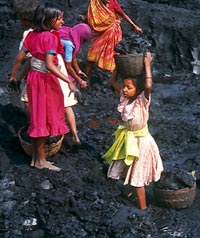For slurry s sake
 The Tata Iron and Steel Company (tisco) owns a washery just outside Dhanbad. A single guard watches over the sedimentation ponds, spread over a square kilometre. Enter a group of 20-25 women, of varying ages. They come from villages as far away as 5-6 km. They have baskets; they have come to collect the drying coal-rich slurry. They will take it home, dry it, mix it with cowdung or diesel and use it as cooking fuel.
The Tata Iron and Steel Company (tisco) owns a washery just outside Dhanbad. A single guard watches over the sedimentation ponds, spread over a square kilometre. Enter a group of 20-25 women, of varying ages. They come from villages as far away as 5-6 km. They have baskets; they have come to collect the drying coal-rich slurry. They will take it home, dry it, mix it with cowdung or diesel and use it as cooking fuel.
The guard tries to stop them. He cannot. The area is open; no fences, only a bund and a railway track on one side. The women make a beeline for the first series of ponds, which has the richest settled slurry. They fill up the baskets. The guard chases them away, but some outrun him and return from the other side. Now the chase gets serious. The guard runs after the women, and tips one or two baskets over causing the slurry to spill. The baskets are heavy, about 15 kilogrammes. Some of the women manage to get away with a full load.
One of the women, Chalondevi, says she's been doing this for years. "But we come only during the winter months. We try and come everyday for a month, and we are set for the year.'
Our husbands work, we too, as manual labourers in the coalfields. Yes, we fall sick. But what can we do? Our husbands tell us not to
